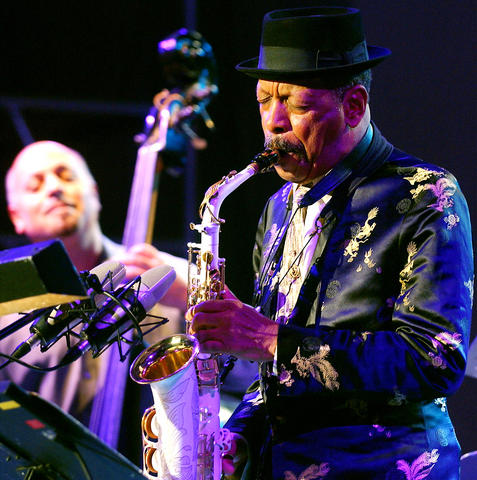Ornette Coleman is a 77-year-old saxophonist who plays below, between and beyond the notes in search of pure feeling. He is Lou Reed's hero, and an artist too avant-garde even for Miles Davis. The songwriter and critic David Was calls him "the Samuel Beckett of jazz" - an apt description for a misunderstood titan, maligned for his originality and daring. Coleman has won the Pulitzer prize and influenced a generation of musicians. But some people still say he just plays out of tune.
The morning before meeting Coleman for the first time, I interview the film director Jonathan Demme, a renowned record collector. When we finish I tell him where I'm headed. His face opens like a flower. "Ornette is an inspirational artist and a beautiful man. Send him a hug from me. Tell him 'Jonathan Demme wants me to hug you.'"
Coleman lives on a noisy midtown Manhattan block. Put on Sound Grammar, last year's Pulitzer prize-winning live album, and you can hear New York in the dive-bombing bowed bass lines, the clattering drums and the dark blue bursts of his saxophone. In 1959, after watching a couple arguing, he wrote Lonely Woman - a beautiful, melancholy melody with a spare, helter-skelter accompaniment. In 2007, he writes music like the hubbub outside his window: urgent, big city exchanges, raised voices, mobile conversations overlapping and following their own logic.

PHOTO: AP
He never stops creating, never falls back on standards and seldom plays what his audience wants to hear. His belief in improvisation is absolute.
Coleman wears high-waisted trousers with braces, a leather pork pie hat, a pinstriped shirt and a gold brooch in the shape of a treble clef. He's an old man, and can be forgetful, but he remains an engaging conversationalist who poses as many questions as he answers. "Do you need to know a note to have an idea?" he asks. "Do you have to think before you make a mistake? Is life a sound?" He is the antithesis of the soundbite-ready old pro.
It takes half an hour of earnest enquiry to get past the impenetrable theoretical system that underpins Coleman's composition, something he calls "harmolodics." Questions about his childhood in segregated 1930s Texas are diverted into a discussion of how "the name of the note doesn't tell you how to use the sound."
"B and C is a half step, right? But in the bass clef it's a whole step. That's crazy," he exhales, with wonder, "and it doesn't change the sound you're making. Do you understand what I'm saying?" I don't. The word harmolodics is a synthesis of harmony, movement and melody. It relates to the fixed tuning of piano, saxophone, French horn and clarinet, and no one fully understands it except Coleman himself.
Coleman can talk theory into the ground, but he is forever seeking to free himself from its constraints. "Rid yourself of repeating and rid yourself of style," he says. "Then you're free. I taught myself everything I know. I have written symphonies and all kinds of music, and no one has taught me."
Coleman's first saxophone was bought with money he had earned shining shoes. "I thought it was a toy and I played it the way I'm playing today," he says. "I didn't know you had to learn to play. I didn't know music was a style and that it had rules and stuff, I thought it was just sound. I thought you had to play to play, and I still think that."
His early inspiration came from gutbucket blues and hillbilly music, as well as Texan sax men Ben Martin and Red Connor, before, as a teenager, he joined local R&B bands and discovered his belief that "human beings, emotionally, have their own notes" was not shared by fellow musicians. When he hit notes "sharp, but in tune, flat, but in tune" he was at best derided, at worst physically attacked. In Baton Rouge, Louisiana, a group of men beat him up, trashed his saxophone, and dumped him by the roadside. "I've had guys take my horn away and say, 'You can't play like that,' and I said, 'Wait a minute, what do you mean? I've already played it. I'm not trying, I'm playing.'"
By the 1950s he was living in Los Angeles and could imitate Charlie Parker note for note. But he found that bebop, itself a revolution in jazz, fell short of the sound he was looking for. "They were playing changes," he says, "they weren't playing movements. I was trying to play ideas, changes, movements and non-transposed notes."
Fortunately, he was not the only musician feeling cramped in Parker's shadow. Working at a department store by day, he gradually assembled a group of jazz players who wanted to go further than their peers. Rehearsals were intense, even though few clubs dared book the new band. With Don Cherry on trumpet, Charlie Haden on double bass and Billy Higgins on drums, Coleman set the template, or lack of it, for what would become free jazz.
Writing in Jazz Review, the critic Martin Williams argued that "what Ornette Coleman is doing on alto will affect the whole character of jazz music profoundly and pervasively." At the group's coming-out party, a residency at the Five Spot in New York in November 1959, Coleman polarized the crowd. George Hoefer described the audience reactions in Down Beat magazine: "Some walked in and out before they could finish a drink, some sat mesmerized by the sound, others talked constantly to their neighbors at the table or argued with drink in hand at the bar."
Listening to the provocatively-titled albums Change of the Century and The Shape of Jazz to Come, it's hard to imagine how the hard-swinging rhythm section and Coleman and Cherry's lyrical, intertwined lines could be so divisive. I ask Coleman if the criticism ever got to him. "I wasn't thinking of insults, I was thinking of ideas. If you don't have ideas, what are you gonna do? The idea is the most universal, it doesn't have any age, it doesn't have any rules or superiors. An idea is an idea, whether it's good or bad. The style cannot compete with the idea."
What he means only becomes clear a couple of nights later, when I sit in on Coleman rehearsing with his current band. Traditional roles of rhythm section, harmonic foundation and soloist have been ditched, to "remove the caste system from sound." Instead, the players riff off each other, transmitting ideas around the group. Coleman rips a short, melodic phrase from his saxophone and the others jump on it, propelling the music forward through variations on the theme, never sacrificing inspiration for the sake of a neat resolution.
This approach demands intense concentration, from players and listeners alike. It threatens to soar off into the incomprehensible, like an untethered helium balloon. But each time the complexity becomes overwhelming, Coleman drags it back down with a dramatic line, reminding us with a stinging, singing cry of his roots in the blues.
In Coleman's vision, a lack of formal training is an asset. He introduced violin and trumpet solos into his music long before he could actually play them with any fluency, as a short cut to pure emotional expression unfettered by habit. His influence extends far beyond jazz - the Stooges, MC5, Patti Smith and the Velvet Underground are all declared fans. Ornette Coleman is punk rock in the truest sense.
Coleman's music is, if anything, more radical now, but he was welcomed into the jazz establishment long ago, albeit not to universal approval. This year he received a lifetime achievement Grammy in addition to a Pulitzer prize and MacArthur Foundation "genius" award. He's not much interested in plaudits. "I don't want to be at the top. I just want to be alive and useful," he says.
As the interview ends, I say, as instructed, "Jonathan Demme told me to hug you." Coleman's already smiling face creases still further. "Oh, he's precious," he says, visibly touched. "Come here. That is so precious." He hugs me, shakes my hand, and as I turn to leave offers one last piece of advice: "The idea is all there is. Trust me."

“Why does Taiwan identity decline?”a group of researchers lead by University of Nevada political scientist Austin Wang (王宏恩) asked in a recent paper. After all, it is not difficult to explain the rise in Taiwanese identity after the early 1990s. But no model predicted its decline during the 2016-2018 period, they say. After testing various alternative explanations, Wang et al argue that the fall-off in Taiwanese identity during that period is related to voter hedging based on the performance of the Democratic Progressive Party (DPP). Since the DPP is perceived as the guardian of Taiwan identity, when it performs well,

The Taiwan People’s Party (TPP) on May 18 held a rally in Taichung to mark the anniversary of President William Lai’s (賴清德) inauguration on May 20. The title of the rally could be loosely translated to “May 18 recall fraudulent goods” (518退貨ㄌㄨㄚˋ!). Unlike in English, where the terms are the same, “recall” (退貨) in this context refers to product recalls due to damaged, defective or fraudulent merchandise, not the political recalls (罷免) currently dominating the headlines. I attended the rally to determine if the impression was correct that the TPP under party Chairman Huang Kuo-Chang (黃國昌) had little of a

At Computex 2025, Nvidia CEO Jensen Huang (黃仁勳) urged the government to subsidize AI. “All schools in Taiwan must integrate AI into their curricula,” he declared. A few months earlier, he said, “If I were a student today, I’d immediately start using tools like ChatGPT, Gemini Pro and Grok to learn, write and accelerate my thinking.” Huang sees the AI-bullet train leaving the station. And as one of its drivers, he’s worried about youth not getting on board — bad for their careers, and bad for his workforce. As a semiconductor supply-chain powerhouse and AI hub wannabe, Taiwan is seeing

Jade Mountain (玉山) — Taiwan’s highest peak — is the ultimate goal for those attempting a through-hike of the Mountains to Sea National Greenway (山海圳國家綠道), and that’s precisely where we’re headed in this final installment of a quartet of articles covering the Greenway. Picking up the trail at the Tsou tribal villages of Dabang and Tefuye, it’s worth stocking up on provisions before setting off, since — aside from the scant offerings available on the mountain’s Dongpu Lodge (東埔山莊) and Paiyun Lodge’s (排雲山莊) meal service — there’s nowhere to get food from here on out. TEFUYE HISTORIC TRAIL The journey recommences with